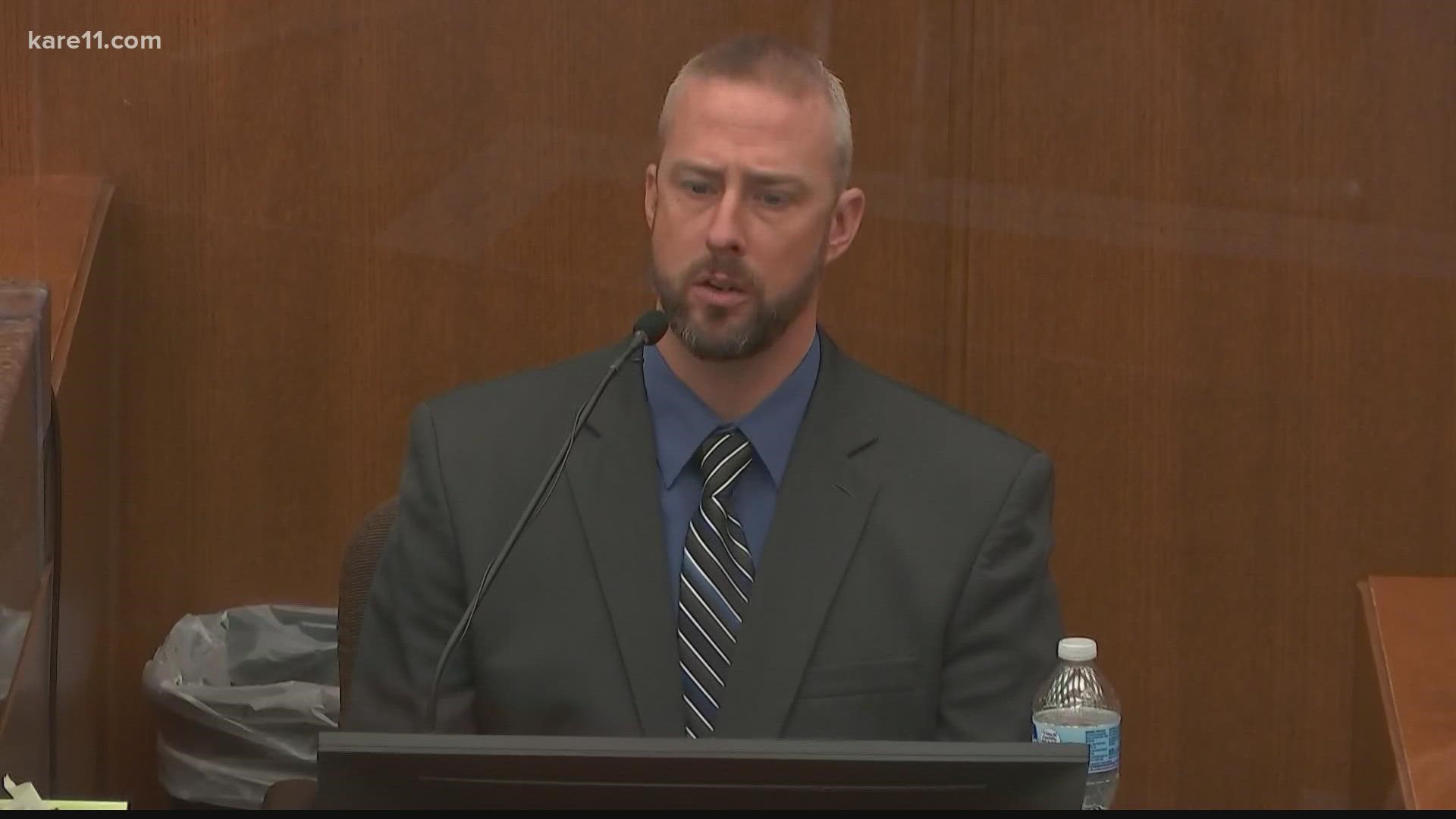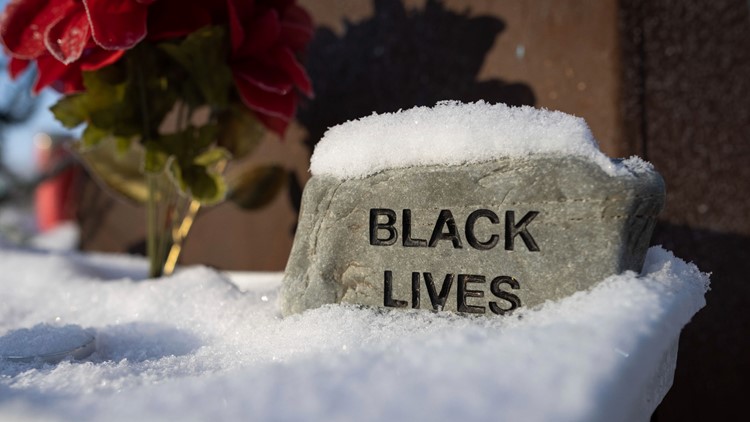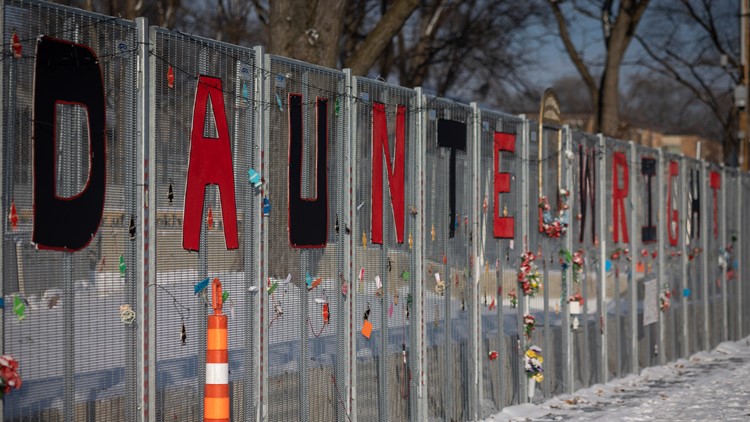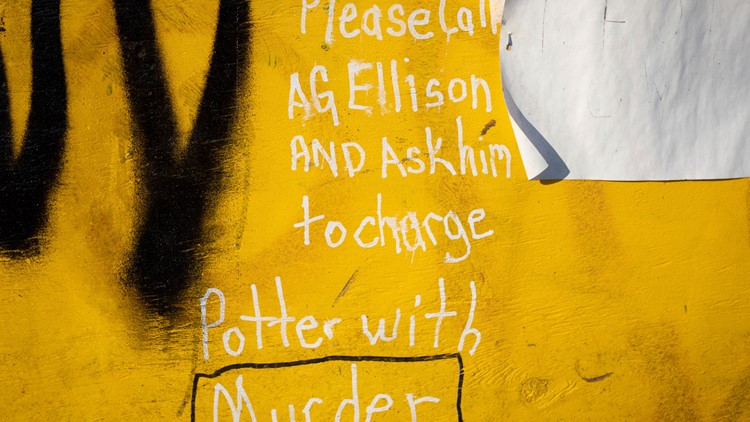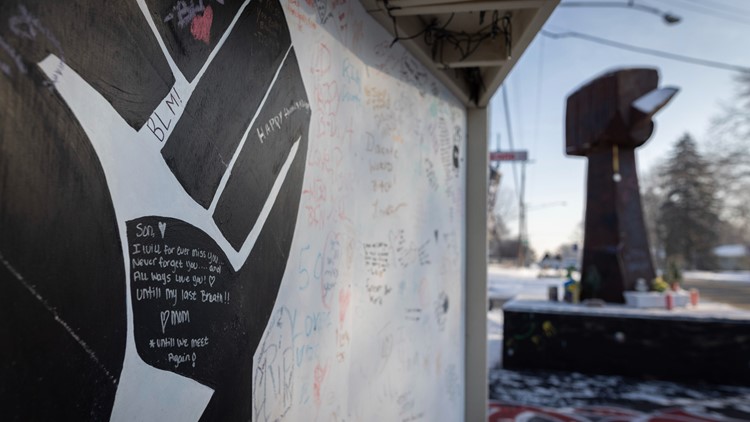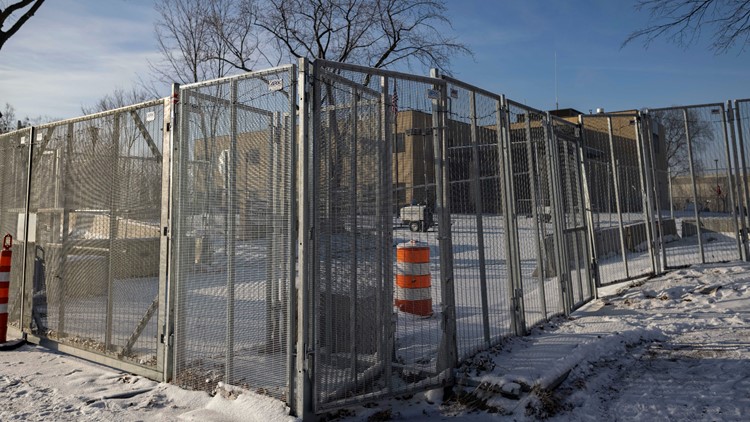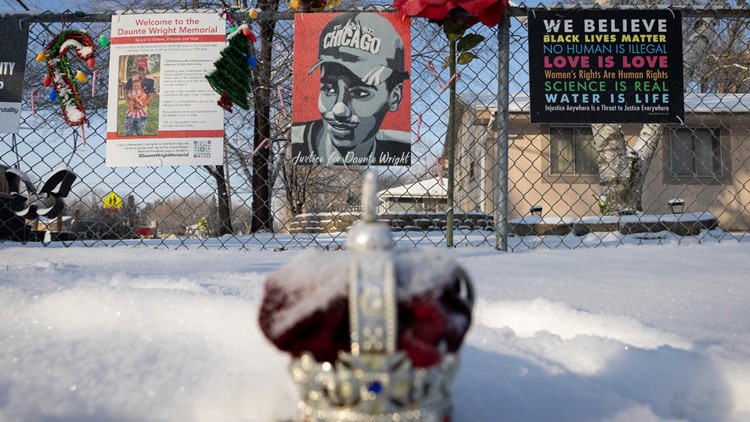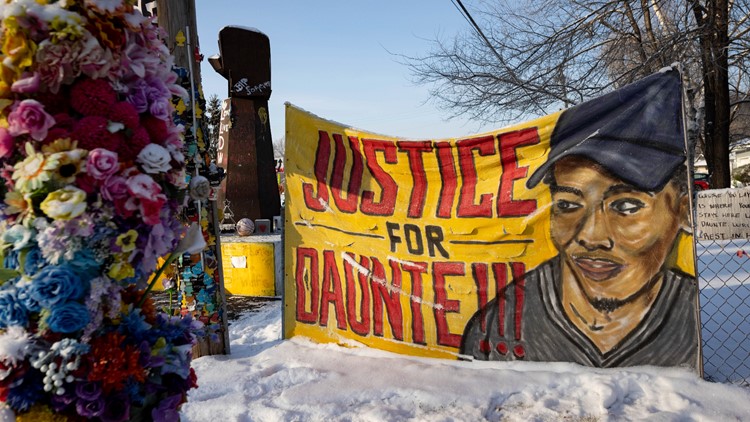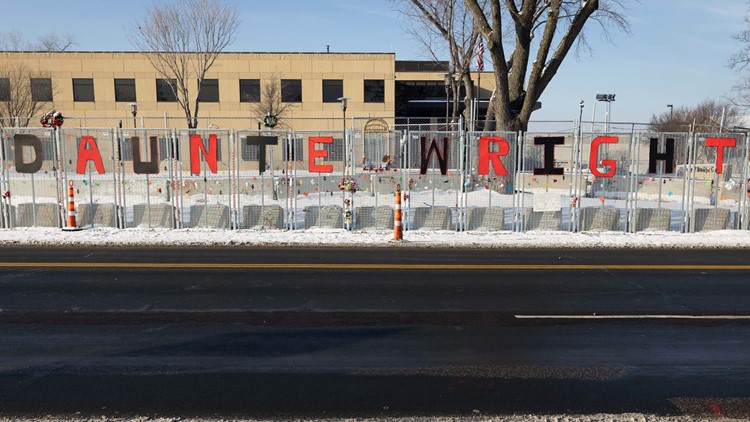MINNEAPOLIS —
- New bodycam video of attempted arrest, shooting of Daunte Wright introduced
- Former Brooklyn Center sergeant details struggle with Wright
- Defense requests mistrial, Judge Chu denies
- North Memorial Ambulance supervisor, paramedic detail Wright's condition as they worked to save his life
- Three police officers, two from Brooklyn Center and one from Champlin, describe hectic scene
- Wright's girlfriend Alayna Albrecht-Payton describes fatal police encounter
Editor's note: The attached video originally aired on Thursday, Dec. 10
On Friday morning the trial of former Brooklyn Center police officer Kim Potter entered the third day of testimony.
Potter faces one count of first and one count of second-degree manslaughter in the April 11, 2021 shooting of Daunte Wright following a traffic stop.
Friday, Dec. 10
1:30 p.m.
Judge Regina Chu opened the afternoon session by informing jurors that due to the developing weather situation court would be dismissed early Friday. She informed both the prosecution and defense teams that the jury would be sent home after the testimony of one or two witnesses.
Former commander, now acting Brooklyn Center Police Chief Tony Gruenig was called to the stand by prosecutors to explain the structure of the department and his role in responding to the scene of the traffic stop where Daunte Wright was fatally shot by one of his officers.
Assistant Hennepin County Attorney Josh Larson asked Gruenig procedural questions, and he described which officers were involved in the shooting and how the investigation was handed off to the Minnesota Bureau of Criminal Apprehension (BCA).
Following Gruenig on the stand was BCA Special Agent Michael Phill. Larson queried Phill about how he arrived in Brooklyn Center with his team to take over the crime scene, and how evidence was collected and brought back to BCA labs for analysis.
Phill described seeing Wright's body laying out in the open, and told the court he ordered a tent put up over it. He told jurors he learned from Gruenig which officers were involved, became familiar with the sequence of events that led to the shooting and then introduced himself to Daunte Wright's family and explained how the investigation would unfold.
11:45 a.m.
Defense attorney Earl Gray cross-examined Major Mychal Johnson of the Goodhue Sheriff's Office, formerly a sergeant with the Brooklyn Center police and Kim Potter's supervisor. Gray asked Johnson what it means if someone has a warrant out for a weapons violation. "It means if they had a weapon before it's possible they have a weapon again," Johnson answered.
Gray also revisited the fact that an order for protection had been issued against Wright. He asked Johnson about the attempt to arrest Wright, and emphasized that Wright resisted and continued resisting, even after being warned by Potter that has was going to be tased.
"Are you supposed to let 'em go? What are you supposed to do?" Gray asked.
"You put them under arrest," Johnson responded.
Gray: ”She was pointing what she thought was a taser," Gray told the courtroom. "At any time between the time you saw him, in the car... until you heard the second 'I'm going to tase you,' did he stop resisting?"
Johnson: "No."
Gray: "Did he enhance his resistance?"
Johnson: "Yes."
Gray asked the witness what would have happened to him if Wright had sped off with Johnson still in the car. The then-sergeant agreed he could have been dragged, hurt or even killed. The defense then brought up Minnesota's use-of-force statute, and asked whether it would be appropriate for Potter to use deadly force if she believed his life was in danger.
"To avoid great death or bodily harm... use a firearm?," Gray asked.
"Yes," Johnson answered.
When allowed to redirect the witness, prosecutor Matthew Frank zeroed in on the use-of-force statute.
"When you use deadly force, do you need to consider your surroundings?" Frank asked Johnson.
Johnson: "Yes."
Frank: "Do you need to know whether you can shoot another police officer or another person?"
Johnson: "Yes."
Frank asked the officer about his position in the car and the possibility he could be dragged if Wright had taken off, asking if Johnson pulled his gun to shoot the suspect, or pulled his taser to tase Wright.
"No," Johnson responded.
In further redirect questioning Gray asked if a vehicle could be considered a weapon, to which Johnson answered yes.
Frank responded by asking the witness whether Brooklyn Center police have a policy against shooting someone driving a vehicle with a taser. Johnson said yes, as incapacitating someone behind the wheel can lead to a crash.
Gray finished with the witness by asking whether Wright's vehicle was moving.
"No," Johnson said.
10:10 a.m.
Prosecutors opened testimony on Day 3 by calling Major Mychal Johnson of the Goodhue County Sheriff's Office to the witness stand. On April 11, 2021, Johnson was a patrol sergeant with the Brooklyn Center Police Department and was officer Kim Potter's supervisor on a daily basis.
Johnson told jurors that he responded to a call for backup from officer Anthony Luckey to assist with a traffic stop. When he arrived he found Luckey in a squad with his field training officer, Kim Potter, and a white Buick in front of them. He explained to the court they informed him that the driver, Daunte Wright, was wanted on a warrant involving firearms and was the subject of an order for protection.
Assistant Attorney General Matthew Frank played video from Johnson's dash and body cams as he drove up on the scene, and the three officers approached Wright's vehicle. Frank had the video started and stopped every second or so, to break down the incident moment by moment.
Johnson described how officer Luckey asked Wright to step out of the vehicle, which he did. At that point Johnson verbally informed Wright he was under arrest, and Luckey asked Wright to turn around and place his hands behind his back. "I heard him (Luckey) say something like 'don't pull away,'" Johnson told the court, and then told jurors that Wright scrambled back in the vehicle.
The then-sergeant said he opened the passenger door, reached across to grab the gear shift knob and ignition in an attempt to keep Wright from driving away, and then grabbed his right arm with both hands.
"I heard taser taser taser," Johnson recalled, "and I heard a loud pop. I thought it was a taser."
The pop turned out to be Potter's gun discharging into Wright. The video shows Wright's car accelerating from the scene, and Potter begins screaming. "I shot him, Oh my God!" At that point Johnson's bodycam video shows Potter staggering over to the boulevard and laying down on the ground face first, screaming "Oh my God, Oh my God" over and over. Potter also said she was going to prison.
"Kim, that guy was trying to take off with me in the car," Johnson told Potter, trying to calm her.
The video shows Johnson collecting Potter's firearm, as he told the prosecutor he knew it would be an important piece of evidence. He put his own gun in her holster.
"Kim, we'll get it all figured out, OK?," Johnson is heard saying.
"I don't know what happened," she responded.
Potter is placed in the back of a squad car. Bodycam video shows Brooklyn Center police officer Colleen Fricke, who Johnson said expressed concern that Potter would harm herself. At that point Johnson asks Potter to see his weapon. "Kim, can I see my gun real quick? I'll give it right back to you, OK?"
Potter hands the weapon to him, Johnson is seen walking away from the squad so Potter can't see him, and removes the clip from the gun so it is unloaded before returning it to her. "Where's mine?" Potter asks.
"I have yours," the sergeant responds. He later turns Potter's weapon over to BCA investigators.
Thursday, Dec. 9
Thursday saw a number of witnesses on the stand, including Wright's girlfriend, paramedics and police officers who responded to the scene following the shooting, and an elderly woman whose vehicle was struck by Wright's car after he was shot.
Alayna Albrecht-Payton, Wright's girlfriend, was the first to face questioning from prosecutors. She spoke about their relationship, and the events that led up to the shooting.
Patricia Lundgren, 84, was next on the stand. She told the court about how she and her 86-year-old husband's vehicle was hit by Wright's car as it crossed the centerline on 63rd Avenue in Brooklyn Center, Wright's foot still on the gas pedal. Lundgren said her husband is now in hospice care with “lots of problems…lots worse since the accident.”
Her daughter took the stand next, and confirmed the crash had devastating impact on her father.
Brooklyn Center police officer Alan Salvosa told the courtroom he heard about a traffic stop involving a warrant over his radio and responded as backup. Jurors watched as Salvosa's body and squad car cameras captured the devastating crash and the chaos that ensued.
Champlin police officer Daniel Irish testified that he arrived to back up Salvosa, saying he joined other officers trying to safely approach Wright’s vehicle, uncertain if anyone was armed inside. Irish told the court as soon as he determined Wright was unconscious, he and other officers pulled him out and laid him on the ground.
Irish said he checked Wright for injuries, locating his gunshot wound and performed life-saving measures. He told he jury when paramedics arrived they told him to stop attempting to resuscitate Wright, and Irish assumed that direction meant he was dead.
Officer Jeffery Sommers’ story seemed to align with that of both Salvosa and Irish. After arriving and determining Wright was not a threat, he assisted with CPR until paramedics arrived.
When paramedics took over, Sommers said he was tasked with scene security.
The final witnesses called by the prosecution Thursday were two paramedics, Mike Morelock and Dustin Johnson. They testified about their attempts to save Wright's life at the scene of the shooting. Once the medics had decided that there was nothing else they could do, they pronounced Wright dead at the scene and shifted their efforts to caring for the others injured after Wright's vehicle crashed.
As the day came to a close defense attorney Paul Engh asked Judge Chu for a mistrial, claiming the defense was “concerned with the presentation of the state’s case,” and that an “unending” amount of time was spent on prejudicial evidence that he said lacked relevance to what really matters in the case.”
Prosecutor Matthew Frank told Judge Chu the evidence presented goes toward the state’s Blakely evidence, which they need to prove aggravating factors to get a lengthier sentence than state guidelines call for if there is a guilty verdict. He told Chu he didn’t believe the presentation of any of the state’s evidence rose to the level of a mistrial.
Judge Chu denied the defense’s motion.
Court is scheduled to resume Friday morning at 10 a.m.

